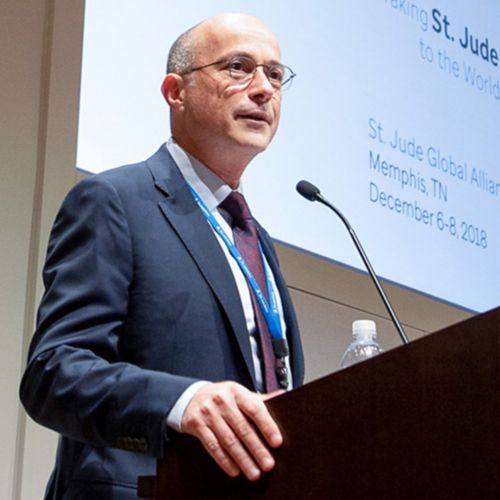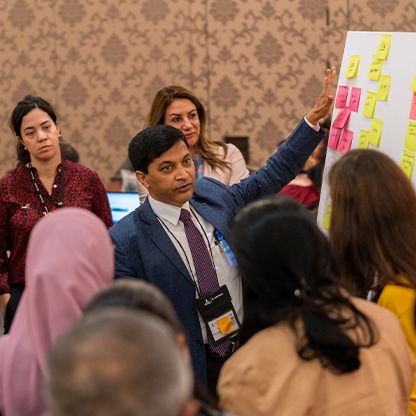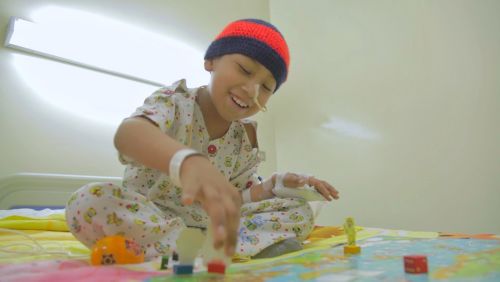St. Jude Family of Websites
Explore our cutting edge research, world-class patient care, career opportunities and more.
St. Jude Children's Research Hospital Home

- Fundraising
St. Jude Family of Websites
Explore our cutting edge research, world-class patient care, career opportunities and more.
St. Jude Children's Research Hospital Home

- Fundraising
Global Scholars: Dr. Ana Patricia Alcasabas
Other Global Scholars Projects:
Dr. Alcasabas wants to address big-picture problems in health care access
From the beginning, Dr. Ana Patricia Alcasabas’ career has required finding ways around obstacles.
In her first job out of medical school, the obstacles were physical. Alcasabas was hired to provide health care to the native Mangyan tribe on Mindoro Island in the Philippines. The job involved a four-hour bus trip, followed by a ferry boat ride and a hike to the top of mountain ranges in the middle of the island. Recalling the hike, she says she took pains to remove her socks and hiking boots before crossing rivers by stepping slowly from rock to rock. “The tribesmen just jumped from one stone to the next wearing flip-flops,” she says.
Alcasabas’ patients lived in huts with split bamboo flooring and relied mainly on fishing and planting. Within months, Alcasabas recognized the tribe faced systemic problems, including malnutrition. She started questioning how much impact she was having as a physician. In those days, she leaned on David Werner’s book, When There Is No Doctor, about providing health care to villages. She was drawn to his quote:

“I became interested in this global child health [because I realized that] as an oncologist … I just work in the hospital. But to make an impact then at the grassroots level — where children suspected of cancer cannot even reach the hospital — I want to make an impact in that.." -- Dr. Ana Patricia Alcasabas
“Primary health workers who earnestly work with people, and learn from them, and learn from the obstacles to health, will necessarily become politicized.”
That sentiment — a passion for eliminating obstacles, empowering people, collaborating on solutions — helped to drive Alcasabas from a formative consulting position at the National University Hospital in Singapore to her current role as a pediatric oncologist at the University of the Philippines, Philippine General Hospital (UP-PGH). She now heads the pediatric hematology oncology section for UP-PGH, a referral center that provides specialized medical treatment for lower-income residents.
At the National University Hospital, Alcasabas helped oversee care of pediatric solid tumor patients. She also collaborated with Dr. Carlos Rodriguez-Galindo, then at the Dana-Farber Cancer Institute, Dr. Matthew Wilson, St. Jude, and Dr. Mae Dolendo, Southern Philippines Medical Center, to develop a retinoblastoma program in Mindanao Island, Philippines.
The Global Scholars Program is the latest step in her journey, sharpening her focus on new sets of obstacles to overcome. As Alcasabas worked through her second year, she considered why some children never reach the referral center. “You realize that a child has a late or missed diagnosis because of problems in the health-care system,” she says.
Alcasabas’ Global Scholars Project is focused on evaluating the implementation of the Universal Health Care program in her home country of the Philippines, specifically for pediatric acute lymphoblastic leukemia patients. “I chose the topic because financial constraints are the number one reason why children are brought late [to] the hospital and why they stop treatment,” she says.
With respect to UHC, she notes there is sometimes a lack of awareness among families that they are eligible for those benefits. Other times, she says, doctors could do a better job in assisting families with their enrollment. Alcasabas’ project aims to evaluate how facilities across the country are doing with UHC enrollment and to find ways to improve their systems related to that enrollment and implementation.
The opportunity then to take a bigger picture look at health systems, leadership, economics, and policies drew Dr. Alcasabas to the Global Scholars Program. “I became interested in this global child health [because I realized that] as an oncologist … I just work in the hospital. But to make an impact then at the grassroots level — where children suspected of cancer cannot even reach the hospital — I want to make an impact in that..”
“It’s kind of like a maturity process,” Alcasabas says. “You have a goal to develop yourself. Then you develop your hospital or program. Next, you try to expand your horizon and then address things in the country.”


